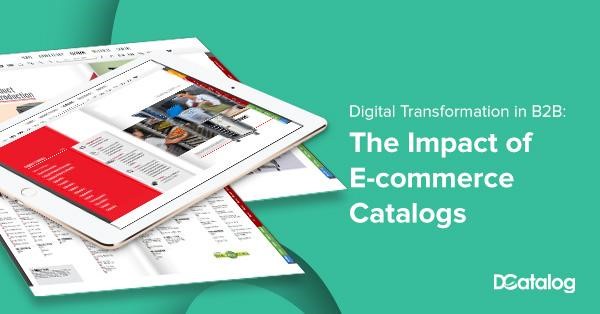Inch thick printed wholesale catalogs are time consuming, wasteful, and not environmentally friendly. Or, these traditional materials are irreplaceable sales and marketing tools. While the answer varies depending on which B2B wholesaler you speak to, it is undeniable that the digital realm is fast overtaking the land.
In the landscape of B2B transactions, digital transformation has emerged as a catalyst for innovation and efficiency. At the heart of this transformation lies the B2B ecommerce catalog, a powerful tool reshaping the way businesses discover, showcase, and procure products and services.
This article examines the pivotal role that B2B digital catalogs play in eCommerce, how this digital collateral will boost sales and reach, and why it is always the right time to make the switch to digital.
The Evolution of B2B E-commerce Catalogs
Traditionally, B2B transactions operated through intricate networks of sales representatives, paper catalogs, and phone calls. However, the digital revolution has ushered in a paradigm shift, with B2B E-commerce catalogs becoming a central component of modern business interactions.
In the world of buyers, any type of catalog has its good and bad points. A traditional print catalog is a familiar shopping experience that makes customers feel comfortable. They can mark them up, bend the corners of the pages, or circle their favorite products.
However, physical catalogs have restrictions and limitations. Because they are printed and sent out in the mail, there is no way to update inventory, or quickly correct mistakes. The space and printing resources are limited. Often, print catalogs can only be a certain number of pages, which means the layout is crammed with images, information, skus, and more.
Customers like to have all the information up front. Today’s busy world has made patience short and gratification long. Digital catalogs serve as dynamic, interactive platforms that facilitate seamless product discovery, streamline procurement processes, and enhance overall collaboration between businesses.
B2B Catalog Software: Powering Digital Innovation
B2B catalog software stands as a linchpin in the digital transformation of B2B commerce. This specialized software empowers businesses to create, manage, and distribute their digital catalogs efficiently. The significance of B2B catalog software extends beyond mere digitization; it catalyzes innovation, agility, and responsiveness in the highly competitive B2B landscape.
- Streamlining Product Management: B2B catalog software offers robust tools for product management, allowing businesses to organize and categorize a vast array of products systematically. This streamlines the process of adding, updating, and removing products from the catalog, ensuring that the information presented to buyers is accurate and up-to-date.
- Dynamic Content Presentation: One of the key features of B2B catalog software is its ability to create dynamic, visually appealing content. Businesses can leverage customizable templates, high-resolution images, and multimedia elements to showcase their products in a compelling and engaging manner. This dynamic presentation goes beyond static catalogs, capturing the attention of B2B buyers.
- Personalization for B2B Relationships: B2B catalog software facilitates personalized experiences for clients. By segmenting customers based on their preferences, purchase history, and industry, businesses can tailor catalog content to meet the specific needs of individual buyers. This personalization enhances customer relationships, fosters loyalty, and contributes to a more efficient procurement process.
- Integration with ERP Systems: Seamless integration with Enterprise Resource Planning (ERP) systems is a hallmark of advanced B2B catalog software. This integration ensures that catalog information is synchronized with back-end processes, providing real-time data on inventory levels, order status, and other critical aspects. The result is a cohesive and streamlined B2B workflow.
- Analytics and Insights: B2B catalog software includes analytics tools that provide businesses with valuable insights into buyer behavior. Metrics such as page views, click-through rates, and popular products offer actionable data for optimizing catalog content, refining marketing strategies, and making informed business decisions.
The Dynamics of a B2B Catalog: Beyond Product Listings
In the realm of B2B E-commerce, a catalog is not merely a listing of products; it's a dynamic platform that plays a multifaceted role in facilitating the entire procurement process. B2B catalogs are oriented towards products that will be purchased by other businesses. Catalog management within the B2B ecommerce sphere refers to managing, organizing, editing, sharing product data both with buyers, shoppers, and eCommerce systems.
B2B catalogs serve as comprehensive information hubs for buyers. In addition to product details, catalogs can include rich content such as technical specifications, user manuals, and pricing information. This wealth of information empowers buyers to make informed decisions and eliminates the need for extensive back-and-forth communication.
For B2B buyers dealing with a myriad of products and suppliers, a centralized procurement platform is invaluable. B2B catalogs consolidate diverse product offerings into a single, easily accessible interface. This centralization streamlines the procurement process, reduces complexity, and enhances efficiency for buyers.
B2B catalogs offer customization options that cater to the diverse needs of different buyers. Whether serving different industries, geographic locations, or specific client segments, businesses can tailor catalog content to align with the unique requirements of each buyer group, fostering stronger relationships.
The Impact of B2B E-commerce Catalogs on Business Operations
The adoption of B2B E-commerce catalogs has far-reaching implications for business operations, spanning areas such as sales, marketing, customer service, and overall strategic decision-making.
- Accelerating Sales Cycles: B2B E-commerce catalogs accelerate sales cycles by providing buyers with instant access to product information, pricing details, and ordering options. The efficiency gained through digital catalogs minimizes delays in the purchasing process, leading to quicker decision-making and order fulfillment.
- Global Reach and Accessibility: Digital catalogs transcend geographical boundaries, enabling businesses to showcase their products to a global audience. This expanded reach opens up new markets and opportunities for growth, allowing B2B enterprises to connect with buyers around the world without the limitations of traditional sales channels.
- Cost-Efficiency and Sustainability: The digital nature of B2B catalogs contributes to cost-efficiency and sustainability. Businesses can significantly reduce costs associated with printing, distribution, and manual data entry. This shift towards digital processes aligns with broader corporate sustainability goals, making B2B operations more environmentally friendly.
- Data-Driven Decision-Making: B2B catalog software generates valuable data that empowers businesses to make informed decisions. From understanding buyer preferences to identifying popular products, the data-driven insights derived from catalog analytics guide strategic decisions in marketing, inventory management, and overall business strategy.
- Improved Customer Service: B2B E-commerce catalogs enhance customer service by providing a self-service platform for buyers. The accessibility of detailed product information, the ability to track orders in real-time, and the streamlined procurement process contribute to a positive customer experience, reducing the need for extensive customer support interactions.
Conclusion
The B2B E-commerce catalog stands as a powerful catalyst for the digital transformation of B2B commerce. The integration of advanced B2B catalog software empowers businesses to create dynamic, interactive, and personalized catalog experiences that go beyond traditional listings. The impact of B2B E-commerce catalogs extends across various facets of business operations, from sales and marketing to customer service and strategic decision-making.
As businesses continue to embrace digital transformation, the B2B E-commerce catalog emerges as a key enabler, providing a dynamic platform for collaboration, information dissemination, and efficient procurement. The future holds exciting possibilities, with AI, AR, and other innovations poised to further enhance the capabilities of B2B catalogs.
For B2B enterprises navigating the complexities of a rapidly evolving digital landscape, the B2B E-commerce catalog remains an indispensable tool for driving growth, enhancing customer relationships, and staying ahead in the competitive marketplace.


No comments yet